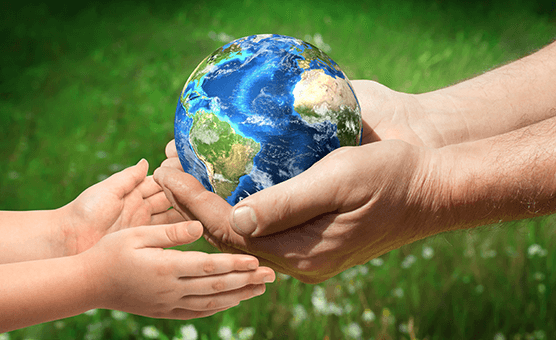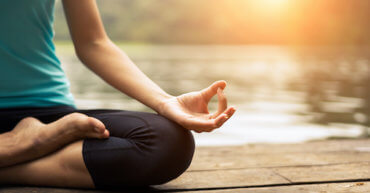April 19, 2021
Honor the Earth to Heal Yourself

By Julie Gregory, Chief Health Liaison for Apollo Health
As we prepare to celebrate Earth Day, it’s a perfect time to reflect on the interdependent relationship between caring for the planet and caring for ourselves. When I first began my healing journey, I was so focused on saving my own life that I failed to see the bidirectional connection between the health of the planet and my personal health. My healing began with dramatically changing my diet and lifestyle, which helped me to begin to comprehend how a chemical-laden planet and compromised food system had contributed to my poor health. The choices I make now are not only healing myself but also helping to heal the planet. If each of us does our part, we can make our little piece of Earth a better place for generations to come. See ways that you can heal yourself and care for the planet at the same time.
- Filter your water We know that tap water often contains bacteria, viruses, multiple metals, organic toxins, traces of pharmaceuticals, and other contaminants but purchasing bottled water is not the answer. Over 80% of plastic water bottles end up in landfills. Each bottle takes up to 450 years to decompose, leaking harmful chemicals, including bisphenol-A and antimony, into the environment. The toxins from decomposing bottles of water leach into our groundwater, causing a variety of health issues, including hormonal imbalances, cancer, lung disease, heart problems, stomach ulcers, and more. Even worse, when plastic water bottles are exposed to heat (at any point during transit or storage), small amounts of these toxins leach into the bottled water, directly harming us when we drink them. Ditch your plastic water bottles; they’re endangering you and the environment. Instead, consider filtering your own water with a reverse osmosis water filter system. When you’re on the go, carry filtered water in portable stainless steel water containers.
- Take an eco-friendly walk The next time you go for a walk, make it even more purposeful by cleaning up the land around you. Litter, blown from trash bins or tossed by careless consumers, accumulates and not only threatens the beauty around us but also threatens the health of wildlife — including our species. Litter and debris that get into our waterways through storm drains can leach harmful chemicals into our soil and water supply. Bring a pair of protective gloves and two large trash bags, one for recyclable litter and one for general trash. By walking and periodically stooping, you’ll be mimicking the millennia-old exercise pattern of your hunter-gatherer ancestors, strengthening your body, thereby reducing your risk for all chronic diseases, including Alzheimer’s, while also caring for the Earth.
- Rethink your lawn All of those chemicals used to make your lawn “golf-course” perfect eventually find their way into our waterways, threatening our health and the entire ecosystem. Examples of the global threat caused by lawn and garden chemicals range from the increasing number of toxic algae blooms causing expanding “dead zones” in our lakes and oceans to the health effects from glyphosate. (See a safe weed treatment alternative here.) Even worse, the problem is self-perpetuating as chemically treated lawns create unhealthy soil, deficient in essential minerals with an unhealthy pH balance that can lead to — you guessed it — weeds. If your lawn is also struggling with improper water balance and compacted soil, the problem can be exacerbated. Just as treating the root causes of our symptoms leads to optimal health, we can treat the “root” causes (pun intended) of our struggling lawns to create a lush, chemical-free lawn that will essentially care for itself. See How to Treat Your Lawn Organically for tips on how to get started.
- Protect the pollinators While we tend to think of them as pesky, even terrifying insects, bees are vital to the health of the planet. They pollinate more than a third of the world’s crops and they’re dying in record numbers. Researchers estimate that if bees were to suddenly become extinct, the vegetables and fruits that we rely upon would be cut by half, and prices of our beloved produce would skyrocket. The effects on the global food chain would be devastating as not only would our food supply be harmed, but so would the food supply of all herbivores. Bees need the same thing that we do: food, water, shelter, and a safe and healthy environment to live in and raise their young. Here are specific ways that we can help.
• Consider keeping at least a part of your yard wild to provide shelter, food, and nesting areas.
• Fill your yard with native plants that flower from spring to late fall to provide nectar and pollen that will serve as a source of food for the entire growing season.
• Try to avoid pesticides. (See alternatives here.) Before purchasing any lawn products, check the bee hazard information on the label. If you must spray, do so in the evening when the pollinators are finished gathering for the day.
• Keep a source of water available, which can be anything from a purposefully kept mud puddle to a maintained flowerpot lid. Consider adding some sea salt or wood ashes to provide micronutrients and minerals to their diet.
Encourage your family and friends to adopt similar habits. By protecting the pollinators, we’re protecting our global food supply chain.
- Go green with personal care and cleaning products We all use dozens of personal care (toothpaste, shampoo, body wash, sunscreen, etc.) and cleaning products (laundry detergents, bleach, oven cleaners, air fresheners, etc.) that have the potential to endanger not only our bodies but also the environment. Chemicals from many of these products can harm us as they’re absorbed into our skin or breathed into our lungs, but they also harm the environment when they end up in our waterways, once again threatening our health and ecosystem. It’s easy to imagine how shampoo, detergents, and other “wash-away” products end up in municipal water, but even “stay put” cosmetics and sunscreens end up getting washed off at the end of the day and are also recycled into our water systems. Additionally, aerosol cans full of toxic chemicals, petroleum-based products, and one-time-use plastics end up in our landfills, where they decompose, pollute the ground and eventually the groundwater. This is a perfect example of the double whammy that can occur when we make less than healthy choices and fail to properly recycle and dispose of harmful chemicals. Use resources such as the Environmental Working Group’s Skin Deep Database to choose the healthiest personal care items and their Guide to Healthy Cleaning to choose household products that are safe for you and the environment.
- Choose KetoFLEX 12/3 for the planet! We already know that our heavily plant-based, nutrient-dense, whole foods diet, that emphasizes local, organic, and seasonal non-starchy vegetables from every color of the rainbow, combined with an adequate amount of clean protein and generous amounts of healthy fat, is paramount for optimizing cognition, but did you know that it’s also good for the Earth? Because we prioritize REAL food, as opposed to packaged food, we end up contributing less harmful trash that decomposes in landfills. You can further reduce your carbon footprint by bringing your own reusable cloth grocery bags when you shop. Keep a stash in your car (or better yet, on your bike), so they’re always handy. After all, you never know when you’ll stumble upon a farm stand or farmer’s market. By purchasing organic vegetables and fruits, you’re reducing your cumulative toxic burden as well as the toxic burden to the soil and air. And, for omnivores, the health benefits that come from consuming pastured eggs, poultry, and animals, as well as sustainable, wild-caught seafood, extend from human health to the health of our environment. Everyone can learn more about KetoFLEX 12/3 here, and subscribers can log in for detailed instructions here.
The changes I’ve outlined can be easily implemented, slowly over time, until they become habits. If there’s anything that the past year has taught us, it’s that human beings are as vulnerable as any other species. When we damage the Earth, we ultimately damage our own health. Conversely, when we care for the Earth, we care for ourselves, each other — present and future generations — as well as other species upon whose lives we are dependent. Celebrate Earth Day (and every day) by protecting our shared home, which in turn will lead to improved health for all.




